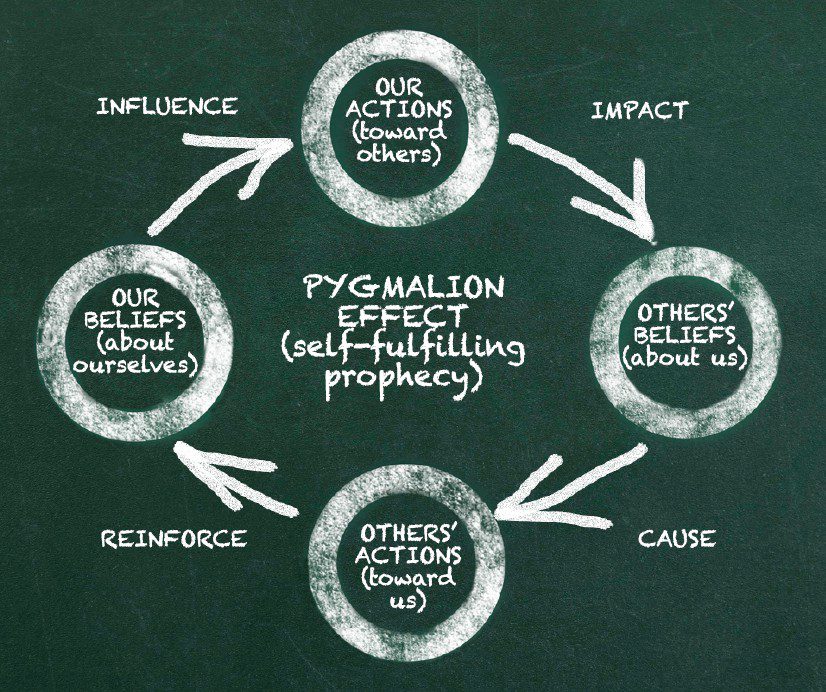Treat a man as he is and he will remain as he is. Treat a man as he can and should be and he will become as he can and should be. – Goethe
The Pygmalion Effect or The Expectancy Theory is a phenomenon whereby others’ expectations of a target person affect the target person’s performance.
The effect is named after the Greek myth of Pygmalion, a sculptor who fell in love with a statue of a woman he had carved & fell in love with it. Unable to love a human, Pygmalion appealed to Aphrodite (the goddess of love), to bring it to life. Aphrodite granted his prayers.
Alternatively called the Rosenthal effect, named after psychologist Robert Rosenthal. And Lenore Jacobson, their research concluded that high expectations lead to better performance and low expectations lead to worse, both effects resulting to a self-fulfilling prophecy.
The Pygmalion Effect is a phenomenon whereby higher expectations lead to higher performance. For example, a manager’s higher expectation on work performance affects the employee’s input, which in turn leads to better job satisfaction and fulfillment while a manager’s low expectations on work performance jeopardize the employee’s output, which in turn leads to low morale & dissatisfaction.
When we expect certain behaviors of others, we are likely to act in ways that make the expected behavior more likely to occur. (Rosenthal and Babad, 1985)

The flip side of the Pygmalion Effect is the Golem effect, which is a psychological phenomenon in which lower expectations placed upon individuals either by supervisors or the individual themselves lead to poorer performance by the individual.
In their book, The Leadership Challenge, James M. Kouzes & Barry Z. Posner, outlined the power of positive expectations:
People need emotional fuel to replenish their spirits. To Recognize Contributions, you need to utilize these two essentials:
- Expect the best Personalize recognition
By putting these essentials into practice, you uplift people’s spirits and arouse the internal drive to strive. You stimulate their efforts to reach for higher levels of performance and to aspire to be faithful to the visions and values of the organization. You help people find the courage to do things that they have never done before.
2. Expect the Best
Belief in peoples’ abilities is essential to making extraordinary things happen. Exemplary leaders elicit high performance because they firmly believe in the abilities of their constituents to achieve even the most challenging goals. That’s because positive expectations profoundly influence not only your constituents’ aspirations but also, often unconsciously, how you behave toward them.
You broadcast your beliefs about people in ways you may not even be aware of. You give off cues that say to people either “I know you can do it” or “There’s no way you’ll ever be able to do that.” You can’t realize the highest level of performance unless you let people know in word and deed that you are confident that they can attain it.
Leaders play Pygmalion-like roles in developing their constituents. Ask people to describe the best leaders they’ve ever had, and they consistently talk about individuals who brought out the best in them. Research on self-fulfilling prophecies provides ample evidence that people act in ways that are consistent with others’ expectations.
When you expect people to fail, they probably will. If you expect them to succeed, they probably will.
In his book, A Complaint Free World, Will Bowen highlighted the following on criticism:
Attention drives behavior. As much as we’d like to feel it’s the other way around, it’s not true. When we criticize someone, we are inviting future demonstrations of what we are criticizing. This is true for your spouse, your children, your employees, and your friends. In George Bernard Shaw’s play Pygmalion, Eliza Doolittle explains this phenomenon to Colonel Pickering:
You see, really and truly, apart from the things anyone can pick up (the dressing and the proper way of speaking, and so on), the difference between a lady and a flower girl is not how she behaves, but how she’s treated. I shall always be a flower girl to Professor Higgins, because he always treats me as a flower girl, and always will; but I know I can be a lady to you, because you always treat me as a lady, and always will.

We are far more powerful in the creation of our lives than we realize. Our thoughts about people determine how they will show up for us and how we will relate to them. Our words let others know our expectations of them and their behavior. If the words are critical, then the behavior will mirror the expectation represented by what we say.
A leader’s job is to inspire people to reach their highest level of performance. When someone does his or her best, the organization benefits and the person experiences the satisfaction of accomplishment. The employee feels the thrill of calling forth hidden resources he or she never knew existed. People grow when they reach deep and do more, and this is exciting and stimulating for them.
- Before you criticize people for their performance, give them a chance to correct it themselves. Chances are, they will. Like criticism, sarcasm is also complaining. Criticism is a complaint wielded as a direct attack, whereas sarcasm is passive-aggressive complaining.
- Sarcasm is a negative comment with a humorous escape hatch. It affords the person making the remark plausible deniability should someone call that person on it.
A leader’s job is the careful balancing of inspiration and direction. The employer usually gets the employees he deserves. —J. PAUL GETTY
The Marva Collins Story
In the Power of Positive Leadership, Jon Gordon shares the inspiring story of Marva Collins. Marva was an elementary school teacher who believed in her pupil, and they lived up to her expectations of them.
Frustrated by the bureaucracy and inadequate teaching in public education, in 1975 she started her own elementary school, Westside Preparatory School, in Garfield Park, an impoverished Chicago neighborhood. There she taught children, many of whom had been wrongly labeled as “learning disabled,” to read, write, and study classical literature. The system said they couldn’t learn, but Collins believed that with discipline, structure, hard work, and positive reinforcement they could, and many of her former students say she inspired them to believe as well.
She would often put her hand under their chins, lift their heads up, and say, “You are brilliant.” One of her students said when you keep hearing that you are brilliant, you start to believe it. The television show 60 Minutes did a special on Collins and brought a bunch of her former students back for a reunion. Many of those who were told they had learning disabilities were now teachers, attorneys, sales leaders, and successful college graduates. They are living proof of the power of a positive leader who believed in them and was optimistic about their future.

You might not have the manager or supervisor that expects you to achieve great things, but you can use the Pygmalion Effect effect by:
- Setting high expectations for yourself
- Setting ambitious goals
- Exploring and Cultivating your strengths & passions.
- Working on your weaknesses
- Taking full personal responsibility for yourself
- Building a reward system for achieving your goals.
- Having high expectations for people around you/Mentor someone
- Surround yourself with positive people.
- Complaining less and acting more.
All the best in your quest to get better. Don’t Settle: Live with Passion.



Comments are closed.